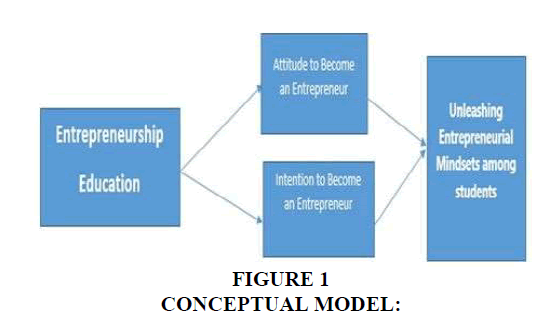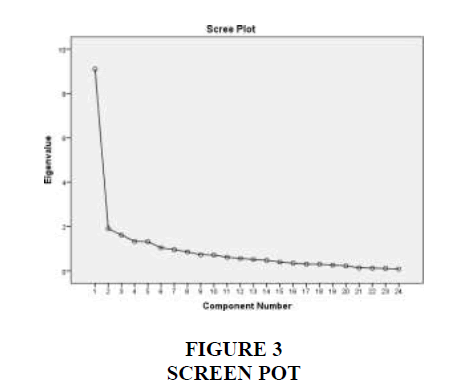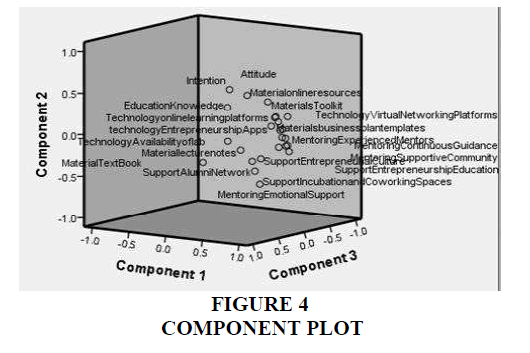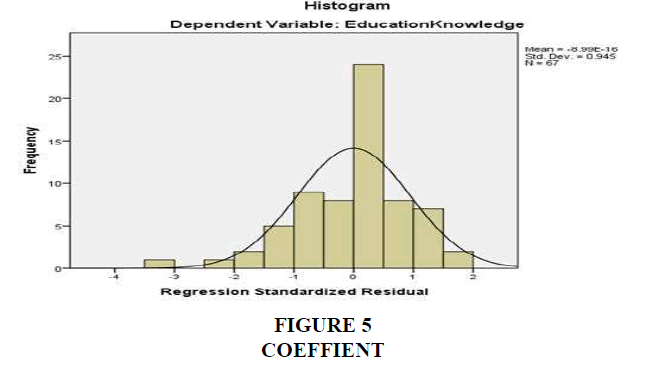Image Article: 2023 Vol: 26 Issue: 5S
Igniting Innovation: Unleashing Entrepreneurial Mindsets through Education
Ashwitha Shetty, Kristu Jayanti College
Thanuja K A, Kristu Jayanti College
Citation Information: Shetty, A., & Thanuja, K.A. (2023). Igniting innovation: unleashing entrepreneurial mindsets through education. Journal of Entrepreneurship Education, 26(S5), 1-13.
Abstract
This study aims to explore the role of education, particularly using the Social Cognitive Theory (SCT), in fostering entrepreneurial mindsets among students and its impact on their intention to engage in entrepreneurial efficacy based on primary data. The objectives of this research are threefold. Firstly, it seeks to assess the existing level of entrepreneurial mindset among students, providing insights into their current attitudes, beliefs, and perceptions related to entrepreneurship using SCT. Secondly, it aims to investigate the correlation between attitude and intention, aiming to understand how a positive attitude towards entrepreneurship influences individuals' intention to pursue entrepreneurial activities, as suggested by SCT. Lastly, this study intends to examine the underlying structure and relationships among variables in the dataset, employing statistical analyses to identify key factors influencing entrepreneurial mindsets using SCT. By achieving these objectives, this research contributes to the growing body of knowledge on entrepreneurial education, specifically in relation to SCT, and its impact on students' attitudes and intentions.
Keywords
Primary, Social Cognitive Theory (SCT), Entrepreneurial Efficacy, Entrepreneurial Education.
Introduction
In today's rapidly evolving and interconnected world, innovation has become the lifeblood of progress and success. The ability to generate fresh ideas, identify opportunities, and take calculated risks is crucial for individuals, businesses, and societies to thrive. At the heart of this transformative process lies the entrepreneurial mindset, a set of attitudes and skills that empower individuals to think creatively, embrace change, and pursue innovative solutions to complex challenges.
Recognizing the paramount importance of nurturing entrepreneurial mindsets, educational institutions are increasingly placing a strong emphasis on fostering innovation and entrepreneurship among students. The traditional model of education, which primarily focused on imparting knowledge and preparing students for predetermined career paths, is evolving to accommodate the demands of the modern world. Today, education is viewed not only as a means to acquire knowledge but also as a catalyst for instilling an entrepreneurial mindset that encourages creativity, adaptability, and resilience.
"Igniting Innovation: Unleashing Entrepreneurial Mindsets through Education" is a compelling initiative that aims to explore the critical role of education in cultivating entrepreneurial thinking and igniting innovation. This comprehensive study examines the various strategies, practices, and approaches that educational institutions are adopting to foster an entrepreneurial mindset among students across different levels, from primary schools to universities.
This report delves into the benefits of integrating entrepreneurship into education and explores how it equips individuals with the essential skills and competencies needed to navigate the rapidly changing landscape of the 21st century. By fostering an entrepreneurial mindset, students are empowered to think critically, solve problems creatively, and seize opportunities, regardless of their chosen career paths.
Moreover, entrepreneurial education equips students with resilience and adaptability, enabling them to embrace failure as a stepping stone to success and navigate uncertainties with confidence.
The report also examines the various challenges and barriers that educational institutions face in implementing entrepreneurship education. From curriculum design and teacher training to access to resources and partnerships with industry, a range of factors can impact the effectiveness of entrepreneurial education initiatives. By identifying these challenges and offering potential solutions, this study aims to assist educational leaders, policymakers, and stakeholders in designing and implementing effective strategies to unleash entrepreneurial mindsets among students.
Furthermore, the report highlights real-world case studies and success stories of educational institutions that have successfully integrated entrepreneurship into their curricula. These examples serve as inspiration and provide practical insights into how institutions can create an entrepreneurial ecosystem that nurtures innovation and empowers students to become agents of change.
"Igniting Innovation: Unleashing Entrepreneurial Mindsets through Education" aspires to contribute to the ongoing dialogue surrounding entrepreneurship education and its transformative impact on individuals and society. By examining the current landscape, sharing best practices, and offering recommendations, this report aims to be a valuable resource for educators, policymakers, and stakeholders who are committed to equipping the next generation with the mindset and skills needed to thrive in an increasingly entrepreneurial world.
As we embark on this journey to explore the intersection of education, entrepreneurship, and innovation, it is clear that fostering an entrepreneurial mindset in students is not just an option but a necessity. The ability to think creatively, embrace change, and seize opportunities will shape the future of individuals, communities, and economies. Through the lens of entrepreneurship education, this report aims to inspire and equip educators and institutions to ignite innovation and unleash the potential of young minds worldwide.
Importance of Education on Unleashing Entrepreneurial Mindsets
Education plays a crucial role in unleashing entrepreneurial mindsets and fostering an environment conducive to entrepreneurship. By providing individuals with the knowledge, skills, and mindset necessary to become successful entrepreneurs, education empowers them to identify opportunities, take risks, and create innovative solutions. Here are some key reasons why education is important for unleashing entrepreneurial mindsets:
Skill development: Education equips aspiring entrepreneurs with the essential skills needed to launch and manage a business effectively. It provides a foundation in areas such as business management, finance, marketing, strategy, and communication, which are vital for entrepreneurial success. By acquiring these skills, individuals are better prepared to navigate the challenges and complexities of entrepreneurship.
Knowledge acquisition: Education exposes individuals to a wide range of knowledge and information, including industry trends, market analysis, and best practices. This knowledge is invaluable for entrepreneurs as it helps them identify gaps in the market, understand customer needs, and develop innovative solutions. Moreover, staying updated with the latest developments through continuous learning enables entrepreneurs to adapt to evolving market dynamics and seize new opportunities.
Entrepreneurial mindset cultivation: Education plays a crucial role in developing an entrepreneurial mindset characterized by creativity, problem-solving, adaptability, and a willingness to take calculated risks. Through interactive learning experiences, case studies, and practical exercises, education encourages individuals to think critically, challenge the status quo, and develop an entrepreneurial mindset that fosters innovation and resilience.
Networking and collaboration: Education provides opportunities for entrepreneurs to network with peers, mentors, and industry professionals. Building a strong network is instrumental in entrepreneurship as it enables access to resources, knowledge sharing, and potential collaborations. Through educational programs, entrepreneurs can connect with likeminded individuals, mentors, and potential investors, enhancing their chances of success.
Risk management and resilience: Education equips entrepreneurs with the ability to assess and manage risks effectively. By providing insights into risk analysis, financial planning, and contingency strategies, education prepares entrepreneurs to make informed decisions and navigate uncertainties. Additionally, education instills resilience by teaching individuals to embrace failure as a learning opportunity, adapt to setbacks, and persevere in the face of challenges.
Ethical and social responsibility: Education instills a sense of ethical and social responsibility in entrepreneurs. By emphasizing the importance of sustainability, social impact, and ethical business practices, education encourages entrepreneurs to consider the broader implications of their ventures. This focus on responsible entrepreneurship not only contributes to the betterment of society but also enhances the long-term viability and reputation of businesses.
In summary, education plays a vital role in unleashing entrepreneurial mindsets by providing individuals with the necessary skills, knowledge, mindset, and network to succeed. It cultivates innovation, resilience, and a sense of responsibility, enabling entrepreneurs to identify opportunities, create value, and contribute to economic growth and societal development.
Research Gap
The research gaps related to igniting innovation and unleashing entrepreneurial mindsets through education can be summarized as follows:
• Impact assessment: There is a need for comprehensive evaluation studies that measure the long-term effects of educational interventions on students' entrepreneurial skills, attitudes, and behaviors.
• Pedagogical approaches: Exploring innovative teaching methods, curriculum design, and the integration of entrepreneurship education across disciplines can help identify effective pedagogical approaches for fostering entrepreneurial mindsets.
• Contextual factors: Understanding the influence of cultural, social, economic, and institutional factors on students' attitudes towards entrepreneurship and their readiness to engage in entrepreneurial activities is crucial for designing contextually appropriate programs.
• Teacher training and support: Investigating the preparation and support of educators in delivering entrepreneurship education can help equip them with the necessary knowledge, skills, and resources to effectively foster entrepreneurial mindsets in students.
• Longitudinal studies: Conducting longitudinal research can provide insights into the development of entrepreneurial attitudes and skills over time, helping assess the long-term impact of entrepreneurship education.
Review Of Literature
Colombelli et al. (2022) found that experiential learning can improve the practical knowledge of the students which may help them in establishing new business avenues or identifying the existing problems in a business unit and so on. In such scenario students can apply their ideas for the betterment of the business. DeCoito & Briona (2023) explains the project based learning and digital video game creation and entrepreneurship in teacher education. The implementation of this methodology in the curriculum will help in skill enhancement.
Handayati et al. (2020) education can stimulate the younger generation towards entrepreneurial ideas. It can also influence the mentality and intension of students. Mindset of a person is closely related to psychological aspects and thinking process. Orientation programs can improve the knowledge in this regard.
Hisrich & Soltanifar(2021) states that creativeness can generate entrepreneurship ideas In the minds of people. There are different methods used under the traditional system to motivate creativity such methods are replaced by updated technology including artificial intelligence, Virtual reality, Internet of things etc.
Kouakou et al. (2019) shows the fact that unemployment remains as the major constraint of economic development of a nation. No of people with new business ideas are increasing due to dissatisfaction in their current work place or difficulty in find a job. Starting a new business require more talent and skill which can be developed among young generation.
Saptono et al. (2020) reveals that culture is influencing the entrepreneurial thinking of an individual. Cultural factors and training are closely related to each other, which can also influence the business ideas of in a positive manner. Government has taken necessary steps to introduce orientation among student with a good intention. Implementation of such programs in higher education system can change the creativity and business ideas of students.
Objectives
1. To assess the current level of entrepreneurial mindset among students.
2. To study the correlation between attitude and intention and understand how a positive attitude influences individuals' intention to engage in entrepreneurial activities.
3. To examine the underlying structure and relationships among variables in the dataset
Research Methodology
The research study on "Igniting Innovation: Unleashing Entrepreneurial Mindsets through Education" utilizes both primary and secondary data. The sample size for the research consists of 100 participants who completed a questionnaire designed to collect primary data. To analyze the collected data, various tools such as factor analysis, correlations, and regression are employed Figure 1.
Data Analysis and Interpretation
H0: There is no significant relationship in the variables in the data set
Interpretation: Figure 2 explains that the KMO value obtained is 0.806, which suggests that the dataset is deemed suitable for factor analysis. With a KMO value above 0.6, we can conclude that the data has a reasonably good level of sampling adequacy. This indicates that the variables included in the analysis are likely to exhibit sufficient interring correlations, making them appropriate for further analysis. The test statistic obtained is approximately chi-square distributed with 276 degrees of freedom, resulting in a value of 883.457. The associated p-value is reported as 0.000, which is less than the typical significance level of 0.05. Since the p-value is significant, we reject the null hypothesis and conclude that there is a significant relationship or structure among the variables in the dataset.
H0: There is no significant relationship between supportive entrepreneurial culture factors and entrepreneurial success.
H0: There is no significant relationship between education-related factors and entrepreneurial skills and intentions.
H0: There is no significant relationship between technology-related factors and entrepreneurial outcomes.
Interpretation: For the first hypothesis (H0: There is no significant relationship between supportive entrepreneurial culture factors and entrepreneurial success), the variable "Support Entrepreneurial Culture" has a correlation coefficient of 0.789, indicating a relatively strong positive relationship with entrepreneurial success. This suggests that there may be a significant relationship between supportive entrepreneurial culture factors and entrepreneurial success, which contradicts the null hypothesis. For the second hypothesis (H0: There is no significant relationship between education-related factors and entrepreneurial skills and intentions), the variables related to education have correlation coefficients ranging from 0.605 to 0.712. These coefficients indicate moderate to strong positive relationships with entrepreneurial skills and intentions. Therefore, it seems likely that there is a significant relationship between educationrelated factors and entrepreneurial skills and intentions, contradicting the null hypothesis. For the third hypothesis (H0: There is no significant relationship between technology- related factors and entrepreneurial outcomes), the variables related to technology have correlation coefficients ranging from 0.526 to 0.793. These coefficients suggest a moderate to strong positive relationship with entrepreneurial outcomes. Therefore, it is plausible that there is a significant relationship between technology-related factors and entrepreneurial outcomes, contradicting the null hypothesis Table 1.
| Table 1 Communalities Of The Variables |
||
|---|---|---|
| Communalities | Initial | Extraction |
| Education Knowledge | 1.000 | 0.712 |
| Attitude | 1.000 | 0.661 |
| Intention | 1.000 | 0.690 |
| Material Textbook | 1.000 | 0.698 |
| Material lecture notes | 1.000 | 0.655 |
| Material online resources | 1.000 | 0.554 |
| Materials business plan templates | 1.000 | 0.727 |
| Materials Toolkit | 1.000 | 0.756 |
| Technology Availability of lab | 1.000 | 0.684 |
| Technology online learning platforms | 1.000 | 0.793 |
| Technology Entrepreneurship Apps | 1.000 | 0.526 |
| Technology Business Planning Software | 1.000 | 0.774 |
| Technology Ecommerce Platforms | 1.000 | 0.780 |
| Technology Virtual Networking Platforms | 1.000 | 0.740 |
| Support entrepreneurship Education | 1.000 | 0.605 |
| Support In collation and Co working Spaces | 1.000 | 0.660 |
| Support Alumni Network | 1.000 | 0.670 |
| Support Industry Partnerships | 1.000 | 0.652 |
| Support Entrepreneurial Culture | 1.000 | 0.789 |
| Mentoring Experienced Mentors | 1.000 | 0.553 |
| Mentoring Industry Connections | 1.000 | 0.660 |
| Mentoring Emotional Support | 1.000 | 0.704 |
| Mentoring Supportive Community | 1.000 | 0.609 |
| Mentoring Continuous Guidance | 1.000 | 0.655 |
| Extraction Method: Principal Component Analysis. | ||
H1: First six components are the most important in explaining the variance in the data, while the subsequent components make relatively smaller contributions.
Interpretation: Component 1 has the largest eigenvalue and explains 37.932% of the total variance. Cumulatively, the first component and subsequent components explain 37.932% of the variance. Component 2 has the second-largest eigenvalue and explains an additional 7.926% of the variance Table 2.
| Table 2 Total Variance Explained | ||||||
|---|---|---|---|---|---|---|
| Component | Initial Eigenvalues | Extraction Sums of Squared Loadings | ||||
| Total | % of Variance | Cumulative % | Total | % of Variance | Cumulative % | |
| 1 2 3 4 5 6 7 8 9 10 11 12 13 14 15 16 17 18 19 20 21 22 23 24 |
9.104 1.902 1.617 1.328 1.316 1.038 0.957 0.855 0.728 0.714 0.614 0.561 0.514 0.473 0.396 0.349 0.303 0.301 0.257 0.226 0.136 0.122 0.109 0.081 |
37.932 7.926 6.737 5.535 5.484 4.326 3.987 3.563 3.032 2.975 2.558 2.336 2.142 1.970 1.649 1.452 1.261 1.252 1.073 0.941 0.566 0.510 0.454 0.339 |
9.104 45.859 52.595 58.130 63.613 67.939 71.927 75.490 78.522 81.497 84.055 86.390 88.533 90.502 92.151 93.603 94.865 96.117 97.190 98.131 98.698 99.208 99.661 100.000 |
9.104 1.902 1.617 1.328 1.316 1.038 |
37.932 7.926 6.737 5.535 5.484 4.326 |
37.932 45.859 52.595 58.130 63.613 67.939 |
Cumulatively, the first two components explain 45.859% of the variance. This pattern continues for the subsequent components, with each one explaining a smaller proportion of the variance compared to the previous components. The cumulative percentage of variance gradually increases with each additional component, reaching 100% at the last component. This means that all the variance in the data is accounted for by the 24 components.
A screen plot is a graphical tool used in principal component analysis (PCA) to assess the significance of each component in explaining the variance in the data. It helps in determining the number of meaningful components to retain. Based on the screen plot, the hypothesis from earlier is supported. The first six components appear to be the most significant in explaining the variance in the data, while the subsequent components contribute less Figure 3.
A component plot is a graphical representation of the loadings or weights of variables on each principal component in a principal component analysis (PCA). It helps in visualizing the relationship between variables and components and can provide insights into the structure of the data Figure 4.
Correlation
H0: There is no significant relationship between attitude and intention.
H0: There is no significant relationship between attitude and the availability of material (textbooks, lecture notes, and online resources).
H0: There is no significant relationship between attitude and the availability of resources and tools for entrepreneurship.
H0: There is no significant relationship between attitude and the availability of support systems and networks for entrepreneurship.
Interpretation: Attitude and Intention: There is a strong positive correlation between attitude and intention (r=0.459, p<0.001). This suggests that individuals with a positive attitude are more likely to have a higher intention to engage in entrepreneurial activities. Attitude and Availability of Material-Text Book: Attitude and the availability of textbooks are positively correlated (r=0.313, p<0.001) Table 3. This indicates that a positive attitude is associated with a higher likelihood of having access to relevant textbooks for entrepreneurship education. Attitude and Availability of Material-Lecture Notes: There is a moderate positive correlation between attitude and the availability of lecture notes (r=0.190, p=0.124). Although the relationship is not statistically significant, individuals with a positive attitude may be more likely to have access to lecture notes. Attitude and Availability of Material – Online Resources: Attitude and the availability of online resources are weakly correlated and not statistically significant (r=0.039, p=0.755). This suggests that a positive attitude may not have a strong association with the availability of online resources for entrepreneurship. Attitude and Business Plan templates: Attitude and the availability of business plan templates are moderately correlated (r=0.338, p=0.005). Individuals with a positive attitude are more likely to have access to business plan templates. Attitude and Tool Kit: There is a moderate positive correlation between attitude and the availability of a tool kit (r=0.266, p=0.030). A positive attitude is associated with a higher likelihood of having access to a tool kit for entrepreneurship. Attitude and Availability of Lab: The relationship between attitude and the availability of a lab is weak and not statistically significant (r=0.070, p=0.572). Attitude may not strongly influence the availability of a lab for entrepreneurial activities. Attitude and Entrepreneurship App: Attitude and the availability of an entrepreneurship app are weakly correlated and not statistically significant (r=0.125, p=0.278). A positive attitude may not have a strong association with the availability of an entrepreneurship app. Attitude and Business Planning Software: There is a moderate positive correlation between attitude and the availability of business planning software (r=0.292, p=0.016). Individuals with a positive attitude are more likely to have access to business planning software. Attitude and ECommerce Platform: The relationship between attitude and the availability of an e-commerce platform is weak and not statistically significant (r=0.230, p=0.060). Attitude may not strongly influence the availability of an e- commerce platform. Attitude and Virtual Network Platform: Attitude and the availability of a virtual network platform are moderately correlated (r=0.288, p=0.018). Individuals with a positive attitude are more likely to have access to a virtual network platform for entrepreneurship. Attitude and Entrepreneurship Education: The relationship between attitude and entrepreneurship education is weak and not statistically significant (r=0.068, p=0.587). Attitude may not strongly influence the availability of entrepreneurship education. Attitude and Incubation and Co-working Space: There is a moderate positive correlation between attitude and the availability of incubation and co-working space (r=0.260, p=0.034). A positive attitude is associated with a higher likelihood of having access to such spaces.
| Table 3 Correlation |
|||
|---|---|---|---|
| Tables Variables | Tables Pearson Correlation | Sig. (2- tailed) | Tables Result |
| Attitude | 0.459 | 0.000 | Highly correlated |
| Intention | 0.313 | 0.000 | positively correlated |
| Availability of Material –Text Book | 0.190 | 0.124 | positively correlated |
| Availability of Material –Lecture Notes | 0.039 | 0.755 | Moderately correlated |
| Availability of Material –Online Resources | 0.338 | 0.005 | Moderately correlated |
| Business Plan templates | 0.266 | 0.03 | Moderately correlated |
| Tool Kit | 0.070 | 0.572 | Moderately correlated |
| Availability of Lab | 0.125 | 0.278 | Moderately correlated |
| Entrepreneurship App | 0.292 | 0.016 | Moderately correlated |
| Business Planning Software | 0.230 | 0.06 | Moderately correlated |
| E Commerce Platform | 0.288 | 0.018 | Moderately correlated |
| Virtual Network Platform | 0.068 | 0587 | Moderately correlated |
| Entrepreneurship Education | 0.260 | 0.034 | Moderately correlated |
| Incubation and co working space | 0.114 | 0.357 | Moderately correlated |
| Alumini Network | 0.098 | 0.429 | Moderately correlated |
| Entrepreneur Culture | 0.251 | 0.04 | Highly correlated |
| Experienced Mentor | 0.882 | 0.000 | Moderately correlated |
| Industry Connection | 0.136 | 0.274 | Moderately correlated |
| Continuous guidance | 0.165 | 0.181 | Moderately correlated |
Regression
H0: The implementation of the "Igniting Innovation: Unleashing Entrepreneurial Mindsets through Education" program has no significant impact on the development of entrepreneurial mindsets among students.
Interpretation: The model's coefficient of determination (R Square) is 0.287, which means that approximately 28.7% of the variance in the dependent variable (Education Knowledge) can be explained by the independent variables included in the model. The adjusted R Square value is 0.202, which takes into account the number of predictors in the model and adjusts the R Square value accordingly. Here standard error of the estimate is 0.6246. This represents the average distance between the observed values of the dependent variable and the predicted values from the model. A lower value indicates a better fit of the model to the data Table 4.
| Table 4 Correlation |
|||||||||
|---|---|---|---|---|---|---|---|---|---|
| Model Summaryb | |||||||||
| model | R | R Square | Adjusted R Square |
Std. Error of the Estimate |
Change Statistics | ||||
| R Square Change |
F Change | Df 1 | Df 2 | Sig. F change | |||||
| 1 | 536" | 287 | 202 | 6246 | 287 | 3.388) | 7 | 59 | 004 |
| a, Predictors: (Constant), Mentoring Experienced Mentors, Intention, Material online resources, technology Entrepreneurship Apps, Attitude, Technolog Business Planning Software, Technology Ecommerce Platforms b. Dependent Variable: Education knowledge |
|||||||||
Interpretation: The regression component of the ANOVA Table 5 provides information about the overall performance of the regression model. The F-value of 3.388 indicates that there is a significant relationship between the predictors and the dependent variable. The associated significance level (Sig.) of .004 suggests that this relationship is statistically significant at the conventional significance level of α=0.05. The statistical summary indicates that the regression model is significant, suggesting that the predictors included in the model have a statistically significant relationship with the dependent variable, Education Knowledge.
| Table 5 Anova |
||||||
|---|---|---|---|---|---|---|
| Model | Sum of Squares |
df | Mean square | F | Sig | |
| 1 | Regression | 9.262 | 7 | 1322 | 3.388 | 004 |
| Residual | 23.017 | 59 | 390 | |||
| Total | 32.269 | 66 | ||||
| ‘a, Dependent Variable: Education knowledge b. Predictors: (Constant), Mentoring Experienced Mentors, Intention, Materialonlineresources,technologyEntrepreneurshipapps,Attitude, Technolog Business Planning Software, Technology Ecommerce Platforms |
||||||
Interpretation
• The standardized coefficient (Beta) of 0.353 suggests that Attitude has a moderately strong positive influence on Education Knowledge.
• The standardized coefficient (Beta) of 0.038 suggests that Intention has a very weak positive impact on Education Knowledge, and this coefficient is not statistically significant (p=0.776).
• The standardized coefficient (Beta) of 0.169 indicates that Material online resources have a moderately strong positive influence on Education Knowledge, but it is not statistically significant (p = 0.199).
• The standardized coefficient (Beta) of 0.102 indicates a weak positive impact of Technology Entrepreneurship Apps on Education Knowledge, and it is not statistically significant (p=0.460).
• The standardized coefficient (Beta) of -0.075 suggests a weak negative relationship between Technology Business Planning Software and Education Knowledge, but it is not statistically significant (p = 0.658).
• The standardized coefficient (Beta) of 0.199 indicates a moderately strong positive influence of Technology Ecommerce Platforms on Education Knowledge, but it is not statistically significant (p = 0.296).
• The standardized coefficient (Beta) of -0.163 indicates a weak negative impact of Mentoring Experienced Mentors on Education Knowledge, but it is not statistically significant (p = 0.233) Table 6.
| Table 6 Coeffient | |||||
|---|---|---|---|---|---|
| Model | Unstandardized Coeficients | Standardized Coefficients |
t | Sig | |
| B | Std. Error | Beta | |||
| (Constant) | 1.645) | 0.706 | 2.329 | 0.023 | |
| attitude | 368 | 0.133 | 0.353 | 2.684 | 0.009 |
| Intention | 036 | 0.124 | 0.038 | 0.286 | 0.776 |
| Material online resources | 168 | 0.129 | 0.169 | 1.300 | 0.199 |
| Technology entrepreneurs hip Apps | 106 | 0.142 | 0.102 | 0.744 | 0.460 |
| Tneicnology Business Planning software | -.078 | 0.168 | -0.75 | -0.446 | 0.658 |
| Technology Ecommerce Platforms | 203 | 0.192 | 0.199 | 1.084 | 0.296 |
| Mentoring Experienced Mentors | -0.177 | 0.147 | -0.163 | 1.205 | 0.233 |
| ‘a, Dependent Variable: Education knowledge | |||||
Findings
1. The p-value obtained from the chi-square test suggests a significant relationship or structure among the variables in the dataset.
2. Variables related to education, materials, technology, and support systems exhibit varying degrees of extraction factor loadings, indicating their relationship with the underlying factors.
3. Attitude is positively correlated with intention, indicating that individuals with a positive attitude are more likely to have a higher intention to engage in entrepreneurial activities.
4. The relationship between attitude and the availability of technology-related factors and entrepreneurship resources/tools varies in strength and significance.
5. The "Igniting Innovation: Unleashing Entrepreneurial Mindsets through Education" program has a significant impact on the development of entrepreneurial mindsets among students, as indicated by the significant F-value in the ANOVA Table.
6. Attitude has a moderately strong positive influence on education knowledge, while other predictors such as intention, material online resources, technology entrepreneurship apps, technology business planning software, technology e-commerce platforms, and mentoring experienced mentors do not have statistically significant impacts.
7. The findings suggest that supportive entrepreneurial culture, education-related factors, and technology- related factors play significant roles in entrepreneurial success, skills, intentions, and outcomes. Attitude also emerges as an important factor in predicting entrepreneurial outcomes and education knowledge Figure 5.
Conclusion
The findings indicate that by incorporating entrepreneurship education into the curriculum, students can develop essential skills such as creativity, problem-solving, and risktaking. This approach enables them to adapt to an ever-changing world, contribute to economic growth, and create innovative solutions.
However, further research is needed to explore effective teaching methods, assess longterm outcomes, and address potential challenges. Ultimately, integrating entrepreneurial education can empower students to become confident, resourceful individuals prepared to seize opportunities and drive innovation in their future endeavors.
The findings strongly support the notion that nurturing entrepreneurial mindsets equips students with vital skills, including critical thinking, adaptability, and resilience. This approach not only prepares them for the challenges of a rapidly changing world but also cultivates a spirit of innovation and risk-taking.
However, successful implementation requires ongoing research to refine teaching strategies, evaluate long-term outcomes, and overcome potential obstacles. By embracing entrepreneurship education, we can empower students to become future leaders who drive economic growth and shape a thriving, innovative society.
References
Colombelli, A., Loccisano, S., Panelli, A., Pennisi, O.A.M., & Serraino, F. (2022). Entrepreneurship education: the effects of challenge-based learning on the entrepreneurial mindset of university students.Administrative Sciences,12(1), 10.
Indexed at, Google Scholar, Cross Ref
DeCoito, I., & Briona, L.K. (2023). Fostering an entrepreneurial mindset through project-based learning and digital technologies in STEM teacher education. InEnhancing Entrepreneurial Mindsets through STEM Education, 195-222.
Handayati, P., Wulandari, D., Soetjipto, B.E., Wibowo, A., & Narmaditya, B. S. (2020). Does entrepreneurship education promote vocational students’ entrepreneurial mindset?.Heliyon,6(11).
Indexed at, Google Scholar, Cross Ref
Hisrich, R. D., & Soltanifar, M. (2021). Unleashing the creativity of entrepreneurs with digital technologies. Digital Entrepreneurship: Impact on Business and Society, 23-49.
Kouakou, K.K.E., Li, C., Akolgo, I.G., & Tchamekwen, A.M. (2019). Evolution view of entrepreneurial mindset theory. International Journal of Business and Social Science, 10(6), 116-129.
Saptono, A., Wibowo, A., Narmaditya, B.S., Karyaningsih, R.P.D., & Yanto, H. (2020). Does entrepreneurial education matter for Indonesian students’ entrepreneurial preparation: The mediating role of entrepreneurial mindset and knowledge. Cogent Education, 7(1), 1836728.
Indexed at, Google Scholar, Cross Ref
Received: 09-Jun-2023, Manuscript No. AJEE-23-13717; Editor assigned: 12-Jun-2023, Pre QC No. AJEE-23-13717(PQ); Reviewed: 26- Jun-2023, QC No. AJEE-23-13717; Published: 30-Jun-2023




